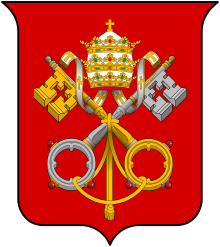Pontifical Academy of Saint Thomas Aquinas
The Pontifical Academy of Saint Thomas Aquinas (PAST) (Pontificia Academia Sancti Thomae Aquinatis) was established on 15 October 1879 by Pope Leo XIII who appointed two presidents, his brother and noted Thomist Giuseppe Pecci (1879–1890) and Tommaso Maria Zigliara, professor of theology at the College of Saint Thomas, the future Pontifical University of Saint Thomas Aquinas, Angelicum.
The academy is one of the Pontifical academies housed along with the academies of science at Casina Pio IV in Vatican City, Rome.
History
The academy was founded with thirty members: ten from Rome, ten from the rest of Italy, and ten from other countries.[1] PAST was one of several Thomist foundations in places such as Bologna, Fribourg (Switzerland), Paris, and Lowden. The Academy was confirmed by Pius X with his apostolic letter of 23 January 1904 and enlarged by Benedict XV on 31 December 1914. John Paul II reformed the Academy on 28 January 1999 with his apostolic letter Inter munera Academiarium,[2] issued shortly after his encyclical Fides et Ratio.
The Pontifical Academy of St. Thomas Aquinas is temporarily headquartered in the Casina Pio IV in the Vatican City. Its objectives, as stated in the Academy's Yearbook 2007, are the following:
- Carry out research, explain, and disseminate the teaching of St. Thomas Aquinas
- Propose St. Thomas Aquinas as a model Christian teacher, seeker of truth, lover of good, and scholar of all learning
- Be at the service of all the teaching of St. Thomas Aquinas in accord with the Christian tradition and the Magisterium of the Church, especially as set out in the encyclicals Aeterni Patris and Fides et Ratio
- Explain, in as much as this is possible, the mystery of faith and the analogical connections between articles of faith according to the thinking of St. Thomas Aquinas, thereby also honouring his title, Doctor Communis
- Encourage interaction between faith and reason, and foster increasing dialogue between philosophy and theology
- Amicable cooperation with members of other academies to promote Christian philosophy and theology
- Stimulate international interaction between scholars of St. Thomas Aquinas and his work
- Further the role of Thomistic thought in society
- Promote education in Thomistic studies and the public's understanding of the ideas of St. Thomas Aquinas
- Encourage research into the work and thought of St. Thomas Aquinas.
The current president of the PAST is O.P. Serge Thomas Bonino, who succeeded Opus Dei priest Msgr. Lluís Clavell Ortiz-Repiso in November 2014.[3] The current secretary is Bishop Marcelo Sánchez Sorondo. Until 1965 the presidency of the PAST was held by a group of cardinals. Pope Paul VI appointed the first single cardinal as president, Cardinal Michael Browne, O.P. After his death in 1971, the presidency remained vacant until the appointment of Cardinal Mario Luigi Ciappi, O.P., in 1979. After his death in 1996, the PAST was reformed. The office of president would no longer be bestowed on a cardinal and its appointment would be for a five-year period. Abelardo Lobato, O.P., professor of philosophy at the College of Saint Thomas, the future Pontifical University of Saint Thomas Aquinas, Angelicum, served as president from 1999 to 2005.
Members in 2011
- Jan Aertsen
- Enrico Berti
- Mauricio Beuchot Puente O.P.
- Inos Biffi
- Serge-Thomas Bonino O.P. (President since 2014)
- Stephen L. Brock
- Jean-Louis Bruguès O.P.
- Rafael Tomás Caldera
- Angelo Campodonico
- Romanus Cessario O.P.
- Lluís Clavell
- Andrea Dalledonne
- Lawrence Dewan O.P.
- Joseph Augustine Di Noia O.P.
- María Celestina Donadío Maggi de Gandolfi
- Jude Patrick Dougherty
- Ricardo A. Ferrara
- Kevin Flannery S.J.
- Yves Floucat
- Eudaldo Forment
- Umberto Galeazzi
- Luz García Alonso
- Wojciech Giertych O.P.
- F. Russell Hittinger
- Reinhard Huetter
- Ruedi Imbach
- José A.Izquierdo Labeaga
- Edward Kaczyński O.P.
- Antonio Livi
- Alejandro Llano
- Mauro Mantovani S.D.B.
- Enrique Martínez
- Fernando Moreno
- Charles Morerod O.P.
- John O'Callaghan
- Michael Pakaluk
- Mario Pangallo
- Günther Pöltner
- Pasquale Porro
- Vittorio Possenti
- Pedro Rodríguez
- Mario Enrique Sacchi
- Marcelo Sánchez Sorondo
- Horst Seidl
- Carlos Steel
- Giuseppe Tanzella Nitti
- Luca Tuninetti
- Georg Wieland
- Robert Wielockx
- John Wippel
See also
- Global organisation of the Catholic Church
- Index of Vatican City-related articles
- Pontifical Academy of Sciences
- Pontifical Academy of Social Sciences
Notes
- Elie Blanc, Dictionnaire de philosophie ancienne, moderne et contemporaine, art. Scholastique, t. 3, p. 559. For criticism of the Accademia Romana see C. Besse, Deux centres du mouvement thomiste, Paris, 1902, which compares Roman Thomists unfavorably with those of Louvain.
- "Inter Munera"
- https://www.catholicculture.org/news/headlines/index.cfm?storyid=23151
Bibliography
- Year Book, first edition, Pontificia Academia Sancti Thomae Aquinatis, Vatican City, 2001.
- Yearbook, second edition, Pontificia Academia Sancti Thomae Aquinatis, Vatican City, 2007.
- D. Berger, In dulcedine societatis quaerere veritatem. Zur Geschichte der Päpstlichen Akademie des hl. Thomas von Aquin. Doctor Angelicus II (2002), 135–180.
- A. Piolanti, La Pontificia Academia Romana di S. Tommaso. Studi Tomistici 17 (1981) 223–235.
